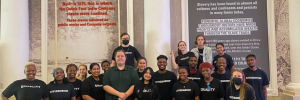
The truth is what the world needs in order to improve.
If I'm being very honest, I didn't and still don't really know the right way to commemorate Human Rights Day. Surely everyday should be a commemoration of every single hunan right we have? We need to go into the world and be cognizant of the fact that we have come so far as humans to be able to have these rights but there is still more work to do. Everyday should be a commemoration of our rights, but the sad truth is that it isn't and this is one of many interesting new viewpoints I learnt after a tour of the Slave Lodge.
I learnt that basic things we struggle and fight for are more than just needs and wants, we have a right to them. A right to further/tertiary education, a right to adequate housing, a right to food and many more, that are constantly being infringed upon. And while we may fight for access to these things, are we actively thinking that one of our human rights is being violated? No, but this is the way we need to start looking at all the injustices in the world. We need to claim our rights and make sure that everyone is being treated fairly according to the Bill of Rights and this needs to be done on a daily basis because human rights are the fundamentals of being human essentially.
Before the 21st of March 2022, I also didn't know what slavery in the South African context meant. Important terminology such as Cape Malays, "Free Burgers", chattle slavery and many more were finally defined and put into perspective. The best thing about the tour was the brutal honesty shared with us. Using the correct wording instead of sugar coating and diminishing the events that happened. It is very easy in this day and age to create fluff pieces to educate everyone on a surface level because we are all too scared to hear the actual truth.
The truth is what the world needs in order to improve. One of the truths we learnt is that sometimes the academics can be wrong.We were encouraged to question researchers and authors (respect their work of course) in terms of the perspectives they came from and the fact that words and the order of words can make a huge difference. It is okay to have an opinion that may not align with what the academics say, especially when it comes to your own history.
Another thing the tour helped me to do was fill the gap between pre- colonial, colonial and apartheid South Africa. Those 3 eras can seem so far apart but they happened consecutively which puts quite a lot into perspective and helps to link your personal history with the history of the country. Learning South African history also entails the learning of African history in general and I think that is so important. Many times, the countries on the African continent tend to iolste themselves but when you look through history, you see all the connections and how the continent cannot function as separate units but needs to function as one whole. I was always an advocate for History being a compulsory subject, but after this I'm even more convinced of it.
I commend the Transformation Office for picking the perfect place to spend Human Rights Day. A lot of what I've learnt, I'm hoping to spread to my community and to as many people as possible. A take away from one of the exhibits, "If you don't know, learn....if you do know, teach" which is something I hope we all start to do.
